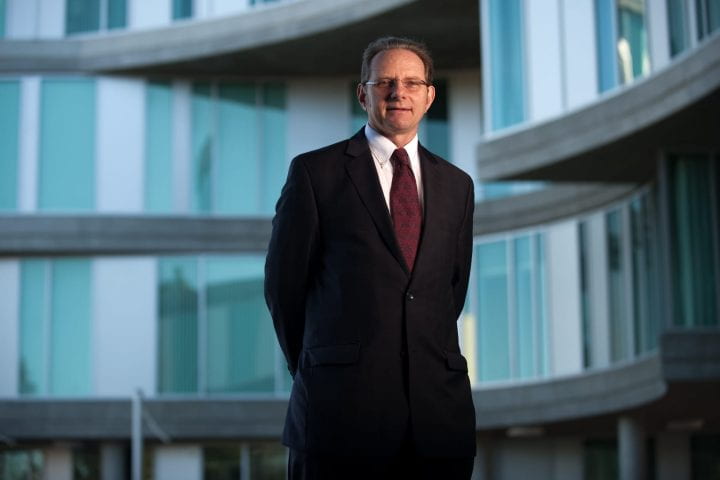Citizen of the world
New humanities dean brings eclectic background to the job

Georges Van Den Abbeele jokingly calls himself a “Euro-cowboy.” Born in Belgium, he was raised in Alberta, Canada – a “prairie province” that hosts the annual Calgary Stampede – and speaks six languages. The work of American pop artist Wayne Thiebaud graces his Humanities Gateway office, along with various awards, diplomas, and an ink-and-watercolor painting of a Bruges canal.
As UC Irvine’s new humanities dean, Van Den Abbeele heads a school that enrolls about 2,800 students and touches nearly all Anteaters at some point in their academic careers. Seventy percent of those in the rigorous, yearlong Humanities Core Course are biological, physical and social sciences majors. Students consistently give the course the highest ratings on campus.
“I view the humanities as the core of the university,” says Van Den Abbeele (pronounced a-BEEL′). “It allows us to evaluate, critique and appreciate issues such as the role of ethics in medicine, the relationship between law and culture, and how one understands the environment and sustainability.”
He adds: “The humanities are about anything human – literally everything we think, do or imagine.”
Van Den Abbeele holds a Ph.D. in romance studies from Cornell University and a bachelor’s degree from Reed College in Portland, Ore. As an undergraduate, he shared meals in the campus cafeteria with classmate Steve Jobs.
“I never would have predicted his success,” he says of the future tech mogul. “That was an important lesson, as you really cannot foresee what people are going to do in life.”
Van Den Abbeele comes to UC Irvine from Northeastern University, where he was founding dean of the College of Social Sciences & Humanities and a professor of English and languages, literatures & cultures. During his tenure, he led initiatives in digital humanities and computational social sciences, international studies and sustainable urban systems.
He fondly recalls leading a talk at the Boston university with Pulitzer Prize-winning author Michael Chabon, a graduate of the UC Irvine School of Humanities’ celebrated M.F.A. program in creative writing.
Before joining Northeastern, Van Den Abbeele served in a number of high-level positions in the University of California system. In 2006, he was appointed dean of humanities at UC Santa Cruz. In this role, he established the Institute for Humanities Research; created a major in Jewish studies; raised endowed chairs in ethics and Sikh studies; and supported programs in digital humanities, Mediterranean studies and ancient world studies.
At UC Davis, Van Den Abbeele directed the Davis Humanities Institute from 1996 to 2006 and chaired the Department of French & Italian from 1997 to 2001. He also guided the Angel Island Oral History Project. From 2003 through 2006, UC Davis students interviewed people processed at the San Francisco Bay immigration station between 1910 and 1940. Their conversations are available in an online archive.
Van Den Abbeele is very happy to be back in California and again working in the UC system. “The University of California is the greatest university in the world,” he says. “We have the unparalleled ability to collaborate freely and readily across multiple campuses on major projects.”
Transforming language learning is something he hopes to tackle during his time at UCI. He sees room for more creativity in the teaching of foreign languages. UC Irvine’s School of Humanities offers courses in 16 of them. In an interconnected world, students who speak more than one language and are comfortable with other cultures have a distinct advantage, he says.
Van Den Abbeele is interested in developing an alternative to the current language teaching model, which usually involves sitting in a classroom for 50 minutes three to five times a week. He believes that a more immersive experience would energize language learners.
An ideal situation, he says, would involve populating residence halls with a mix of students who want to learn a foreign language and native or fluent speakers of that language. Students would participate in language lessons and activities throughout the day and attend cultural events – for example, a French film festival – at night and on weekends.
“One year in this type of setting would result in a really proficient student – one prepared to study, work or do research abroad,” Van Den Abbeele says. “International students often have a hard time connecting with their domestic classmates, and serving as language partners may help meet their social needs too.”
The polyglot professor is also a scholar of French and European philosophical literature and was elected to the European Academy of Sciences in 2008. That same year, he received its prestigious Blaise Pascal Medal in Social Science. His research interests include travel narratives, the history of cartography and tourism/migration studies; critical theory and aesthetics; and humanities and public policy.
Van Den Abbeele seeks to improve the quality of cultural and historical tourism – a fast-growing niche for educated travelers. He foresees humanities students being able to work with libraries, museums, historical societies and archives to heighten the experience of such tourists, he says, adding: “It’s important that tours contain accurate information and not just repetition of local legends.”
Van Den Abbeele is currently settling into the University Hills home he shares with his wife, Beryl Schlossman, a UC Irvine professor of comparative literature. He looks forward to introducing himself to the campus community and building on the School of Humanities’ stellar reputation.
“The strength of UC Irvine’s humanities faculty is unparalleled,” Van Den Abbeele says. “This plays out in both high-quality teaching and trendsetting research. The School of Humanities has really been an international destination for several decades, a place where humanities has been developed, reinvented and reinvigorated.”